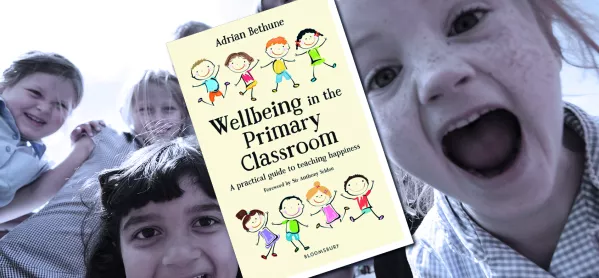- Home
- Book review: Wellbeing in the Primary Classroom
Book review: Wellbeing in the Primary Classroom

Wellbeing in the Primary Classroom: A practical guide to teaching happiness
Author: Adrian Bethune
Details: 224pp, £19.99
ISBN: 9781472951540
As a Buddhist headteacher and deputy CEO of an academy trust (with a degree in psychology) and a school and trust whose ethos is firmly based in creating happiness, I was really interested in reading this book to see how it could enhance our practice.
When my daughter asked me what I thought of it after reading it, my honest answer had to be that it was an enjoyable and easy read - but it hasn’t changed my life. Possibly, Adrian Bethune was already preaching to the converted.
Wellbeing in the Primary Classroom is a book aimed at classroom teachers to help them to teach happiness. Each chapter has a different theme and practical suggestions that can be used in the classroom. Each chapter is backed up by research that is recent, credible and certainly persuasive in supporting the suggestions.
The chapters cover a range of areas such as mindfulness, positive thinking and, my personal favourite, how “it is cool to be kind”. Each one has some lovely positive ideas that can be used in a classroom immediately, but a lot of them are things that good teachers do automatically. The book can be read in order, or each chapter can stand alone if it is of particular interest.
Wellbeing in the Primary Classroom is a reaffirmation that education needs to change and that there are approaches that schools could develop, but it really only provides a taster of each approach. It acts as a signpost to other research, and there are certainly some approaches such as mindfulness that require more understanding than the book provides.
The timing is right because, as Bethune says, the tide is turning in schools. They are beginning to move away from data-driven narrow agendas and are recognising the importance of educating a whole child - and are certainly being mindful of mental health issues among the young.
I applaud the intentions of the book, but I wonder if it is limited in its audience? The book could have been called How to Make Your School Happier and could perhaps have been aimed at leaders to create an ethos, rather than pockets of classroom practice.
Many of the themes would work far more powerfully if embedded into the culture of the school - which would then be shared with parents and governors. Some of the suggestions (such as the minute mile or daily mindfulness) would most likely need to be agreed by the leadership of the school and be consistent across the school or a key stage. Growth mindsets, for example, is difficult to achieve in a school if the whole school does not embrace it; it requires a change in the language of all staff, a behaviour policy and reward policy consistent with this approach, and work with parents.
I agree with everything that Bethune promotes in his book, but it is a shame he did not aim higher - for more radical change - among jaded headteachers fed up with the situation in education wanting to inject happiness into their schools.
I appreciate that he is probably trying to lead the revolution from the ground up, but I think the time is right to appeal to leaders to look at this approach, who can then allow their class teachers the time and freedom to experiment with these approaches. I am not sure what impact this book would have on teachers who teach in a school with an unsupportive ethos. It could inspire small changes (still worthy), but much would be hampered by unsupportive leadership.
The teachers who read this book will probably have many of these suggestions in place already, but it will signpost them to more in-depth information and possibly introduce them to some new ideas.
The teachers who won’t read this book are probably the ones who need to. It would act as a good guide to newly qualified teachers who are looking for practical ideas to promote positivity and it certainly could be shared as a part of teacher training.
I urge the author to please rewrite this book for leaders and promote it in leadership conferences. Change the hearts and minds of school leadership and encourage them to create a culture that allows teachers to embrace these ideas.
Christina Zanelli Tyler is headteacher at West Cliff Primary School in Whitby
Keep reading for just £1 per month
You've reached your limit of free articles this month. Subscribe for £1 per month for three months and get:
- Unlimited access to all Tes magazine content
- Exclusive subscriber-only stories
- Award-winning email newsletters

